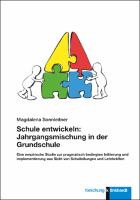Schule entwickeln: Jahrgangsmischung in der Grundschule
Eine empirische Studie zur pragmatisch bedingten Initiierung und Implementierung aus Sicht von Schulleitungen und Lehrkräften
Abstract
"Multi-grade classes are experiencing a renaissance in the current German educational system. On the one hand, pedagogical reasons are discussed. On the other hand, the motto “short legs, short ways” as well as school organizational requirements play a decisive role.
Considering the theoretical background of innovation-specific implications of multi-grade learning, the phases and conditions of school development, and the structure of professional action, the study explores how the initiation and implementation of multi-grade classes for pragmatic reasons are realized. The subquestions of the study investigate challenges of the school development process, action strategies and justifications of school administrators and teachers, their innovation-specific ideas of multi-grade learning, as well as supporting and inhibiting development conditions in the transfer of change to the individual school.
For data collection eight school administrators and 16 class administrators at eight Bavarian elementary schools that had established a so-called “combi-class” 1/2 for the first time were interviewed. The transcripts were analyzed with the qualitative content analysis. In addition, an explicating document analysis was carried out.
The results show that there are role-specific demands on school administrators and teachers. These are: negotiating and planning the initiation and implementation, leading and steering the development process at the individual school, and organizing and implementing the change, especially at the teaching level. The study provides an insight into individual school development processes as well as into circumstances of multi-grade learning that is ordered by school authorities due to demographic reasons or scarce personal resources. The study reveals how challenging it is for school and class administrators to broaden the age groupspecific (homogenizing) view. However, the data also show a rise in professionalization because of this school development process. Despite the top-down process of initiation, multi-grade classes can function as a motor for a changed approach to heterogeneity." "Nicht nur aus pädagogischen Gründen, sondern vor allem unter dem Motto „kurze Beine, kurze Wege“ sowie aus schulorganisatorischen Anlässen erlebt die Jahrgangsmischung in der deutschen Bildungslandschaft gegenwärtig eine Renaissance. Ziel dieser qualitativ-explorativen Studie war es, mehr über das professionelle Handeln, die Handlungsbegründungen und den professionellen Handlungsrahmen der Schulleitungen und Lehrkräfte bei der Einführung von jahrgangskombinierten Klassen aus pragmatischen Gründen zu erfahren. Vor dem theoretischen Hintergrund der innovationsspezifischen Implikationen der Jahrgangsmischung, der Phasen und Bedingungen von Schulentwicklung sowie der Struktur professionellen Handelns geht die Arbeit der übergeordneten Frage nach der Gestaltung der Initiierung und Implementierung von jahrgangsübergreifendem Lernen aus pragmatischen Gründen aus Sicht der betroffenen professionellen Akteure/innen nach. In den Teilfragen eruiert sie die Herausforderungen im Schulentwicklungsprozess, entsprechende Handlungsstrategien und -begründungen aufseiten der Schulleitungen und Lehrkräfte, deren innovationsspezifische Vorstellungen von jahrgangsübergreifendem Lernen sowie unterstützende und hemmende Entwicklungsbedingungen beim Transfer der Veränderung auf die Einzelschulebene.
In leitfadengestützten Experten/inneninterviews wurden dazu acht Schul- sowie 16 Klassenleitungen an acht bayerischen Grundschulen befragt, die erstmals eine sogenannte Kombi-Klasse 1/2 etablierten. Die Auswertung der Transkripte erfolgte mithilfe der inhaltlich strukturierenden qualitativen Inhaltsanalyse, die ergänzt wurde durch eine explizierende
Dokumentenanalyse.
Die Ergebnisse zeigen, dass die Handlungsanforderungen für die Schulleitungen und Lehrkräfte rollenspezifisch im Aushandeln und Planen der Initiierung und Implementierung der jahrgangskombinierten Klassen, im Führen und Steuern des Entwicklungsprozesses an der Einzelschule sowie im Organisieren und Umsetzen der Veränderung, insbesondere auf der Unterrichtsebene, liegen. Die Studie gibt einen Einblick in die einzelschulischen Entwicklungsprozesse sowie die Umstände demografisch und schulorganisatorisch bedingter, von den Schulbehörden verordneter Jahrgangsmischung. Es wird deutlich, wie herausfordernd es für die professionell Handelnden ist, den jahrgangsbezogenen (homogenisierenden) Blick zu weiten. Die Daten zeigen aber auch einen Professionalisierungsschub durch diesen Schulentwicklungsprozess, sodass Jahrgangsmischung, trotz der Verordnung „von oben“, dennoch als Motor für einen veränderten Umgang mit Heterogenität fungieren kann."
Keywords
Schulentwicklung; Jahrgangsübergreifender Unterricht; Grundschule; Primarbereich; Schulleiter; Lehrer; Implementierung; Heterogenität; Professionalität; Pädagogisches Handeln; Empirische Untersuchung; Interview; Leitfadeninterview; Qualitative Forschung; Bayern; Deutschland; School development; Cross-grade teaching; Cross-year teaching; Elementary School; Primary school; Primary school lower level; Primary education; Primary level; Headteacher; Headteachers; School head teacher; Teacher; Heterogeneity; Professionalism; Professionality; Empirical study; Qualitative research; Germany; ProfessionalizationDOI
10.35468/5900ISBN
9783781524606, 9783781559004Publisher
Verlag Julius KlinkhardtPublication date and place
Bad Heilbrunn, 2021Grantor
Classification
Primary and middle schools


 Download
Download Web Shop
Web Shop